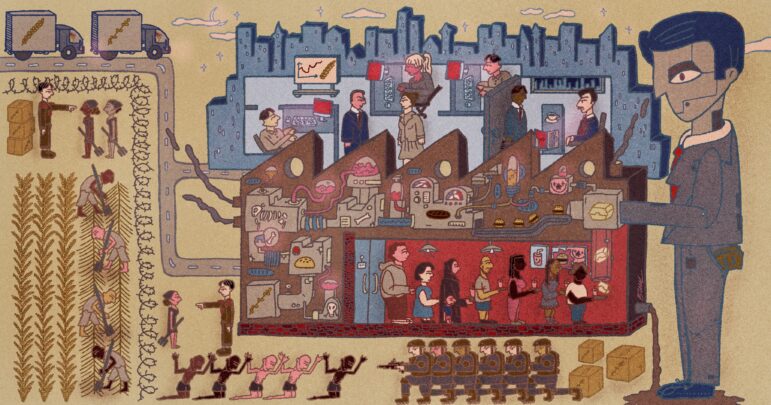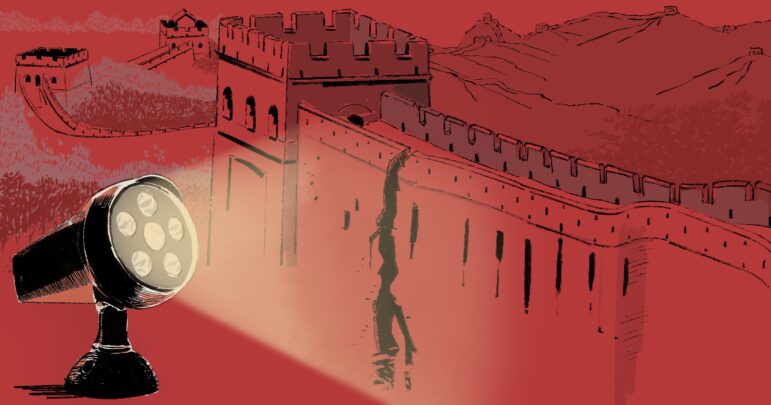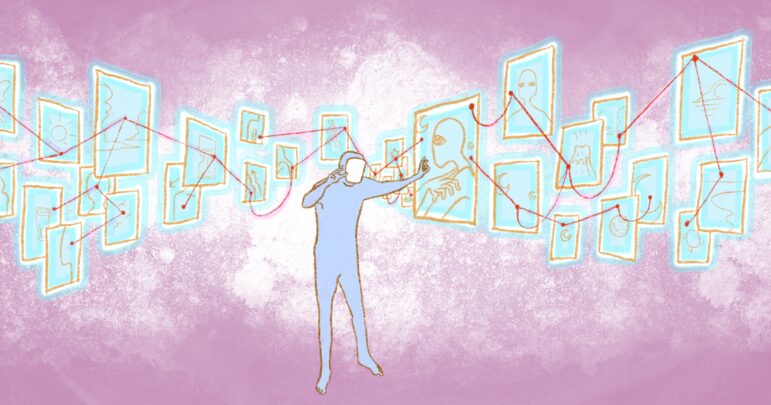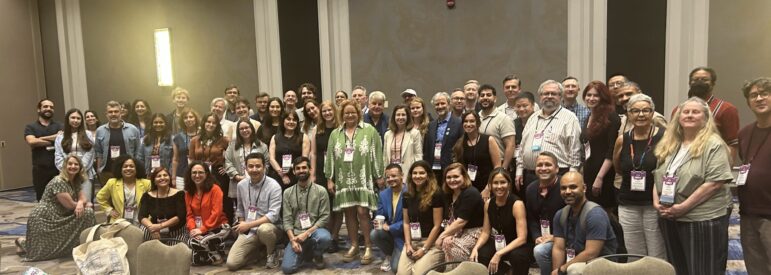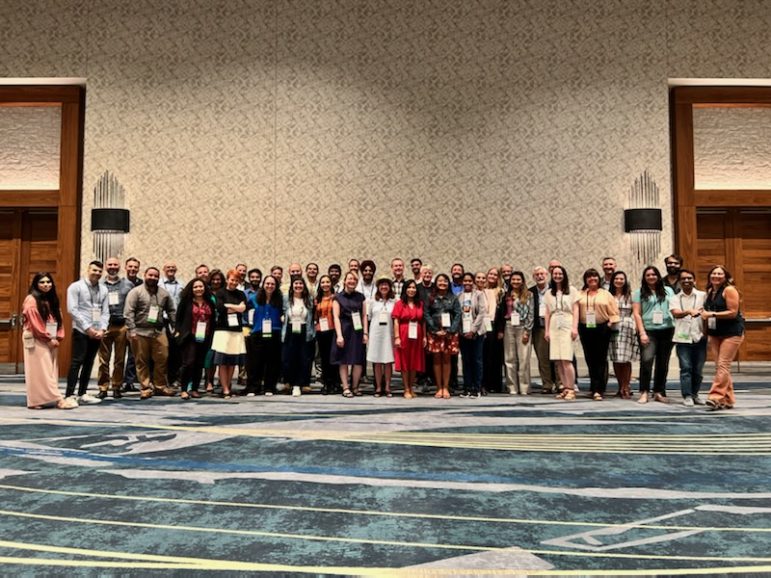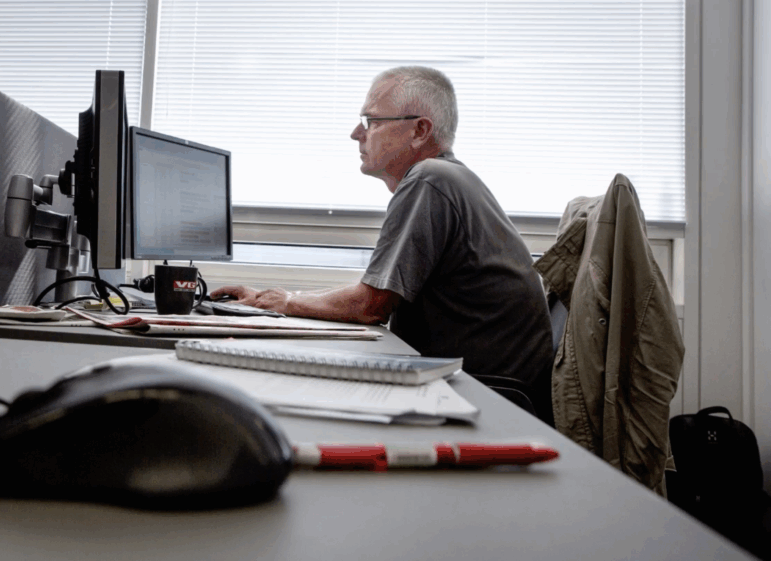

John Bones, who was known as the father of Norwegian data journalism. Image: Courtesy of John Bones
Recognizing John Bones: Norway’s Groundbreaking Data Journalist Who Trained Generations of Global Reporters
When John Bones received a sick leave permission letter after his cancer diagnosis in July 2023, he didn’t hesitate. He tore it up and threw the pieces into a trash can at his SKUP office in Oslo. His reasoning was simple he told colleagues: he needed to devote every remaining moment to organizing support and training for Global South reporters at data conferences and the forthcoming Global Investigative Journalism Conference in Gothenburg, Sweden.
Two months later, 30 young journalists from the Middle East, Asia, Ukraine, and Africa who were part of a SKUP Masterclass – a pioneering program Bones co-founded – sang “Happy Birthday” to him in eight languages, in a symbolic recognition of the far-flung impact the man known as “the father of Norwegian data journalism” has had on the global investigative community.
Today, at a gala event at the 14th Global Investigative Journalism Conference in Kuala Lumpur, Malaysia, the GIJN posthumously honors John Bones with the GIJN Award for Extraordinary Service to International Investigative Journalism.
“John Bones contributed significantly to the growth and empowerment of the global investigative journalism community. His generosity and collaborative spirit knew no borders,” says Emilia Díaz-Struck, GIJN Executive Director. “With this award, proposed and unanimously approved by our board, GIJN honors the work of a journalist who went above and beyond to support investigative journalists worldwide.”
Having served in reporting, editing, and pioneering data journalism roles at VG, Norway’s most-read daily newspaper, from 1993 to 2016, Bones became a regional and global force for watchdog journalism training after he joined the board of Norway’s SKUP – Stiftelsen for en Kritisk og Undersøkende Presse (The Foundation for a Critical and Investigative Press.) — in 2012.
In November 2016, he put aside his own retirement to step in as SKUP managing director at a time of crisis for the foundation. For the next seven-plus years, he led the group to new heights, and reach, until he died in May 2024. Earlier this year, Bones became the first journalist from outside the US to be inducted into the IRE Ring of Honor.
“There are a handful of people around the world who really are key to the success of the global investigative journalism movement, and John was one of them,” says David E. Kaplan, founding director of GIJN. He adds that Bones and his colleagues at SKUP, such as Jan Gunnar Furuly, played an “outsized role” in raising funds and support for numerous GIJCs, and helped organize the global conference in Lillehammer in 2015 as co-hosts.
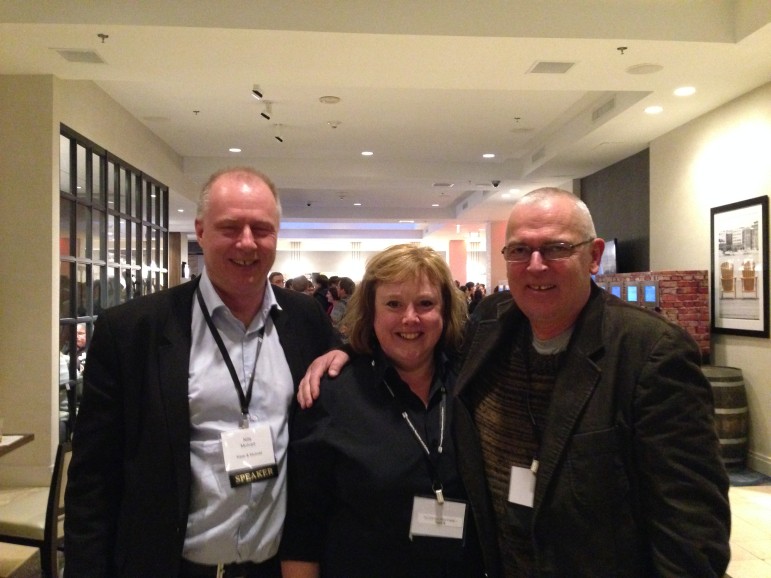
Nordic data journalism pioneers Nils Mulvad, Helena Bengsston, and John Bones (left to right) at the 2014 NICAR conference. Image: Courtesy of John Bones
From Data Journalism Convert to Evangelist
Colleagues say that this legacy began when Bones fully recognized the immense fact-value of data, spreadsheets, and new tools like Excel in the early 1990s, at a time when data journalism did not exist as a craft in Scandinavia. His appetite for learning new data skills and collaborative partners was such that – when his paper would not cover trips to attend the annual NICAR data conferences in the US – he would pay out of his own pocket to attend, and extract every scrap of knowledge from every panel, networking session, bar chat, and hallway encounter. He would go on to lead groups of Norwegian reporters to numerous NICAR, IRE conferences, and GIJCs – often telling his attendees “Don’t have dinner with other Norwegians here: hang out with other journalists here and learn” – and then try to persuade international speakers to travel to Norway afterwards to present on new techniques.
“Today, Norway is the leader in data journalism in Scandinavia. We see so many papers in Norway doing excellent data investigations,” says Swedish data journalism veteran Helena Bengtsson, data editor at Gota Media and Bonnier News Local. “That is a part of John’s legacy.”
The ripple effects of Bones’ career extends to nearly every corner of the world. Furuly points to his role as co-founder of the SKUP Masterclass program, which fully sponsors the attendance of journalists from Asia, Africa, the Middle East, and — recently — Ukraine to advanced journalism workshops led by investigative stars. These include sessions at annual SKUP- and DataSKUP conferences in Norway; at GIJCs; at Arab Reporters for Investigative Journalism (ARIJ) events in Jordan; and the African Investigative Journalism Conference (AIJC) in South Africa. Bones even carried this teaching over to the future of journalism, by organizing Student-SKUP training events for journalism school students.
“He really believed that every reporter everywhere should have the chance to learn the best techniques,” says Furuly. “He saw how reporters’ eyes are opened; how they get inspiration, and go home with an almost religious-type conversion about data and new approaches. He was so passionate about Masterclass, where we now cooperate closely with organizations such as Bellingcat, which provides lecturers and training in advanced OSINT and fact-checking techniques.”
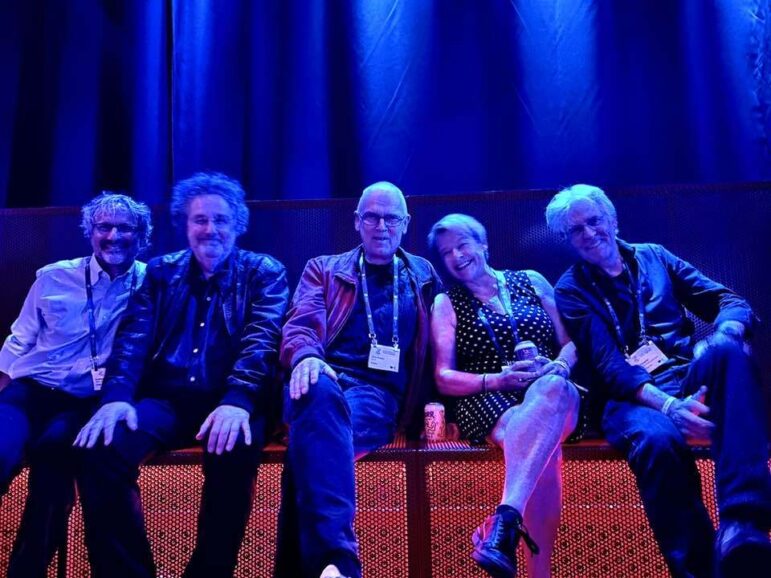
Andrew Lehren, Anton Harber, John Bones, Margo Smit, and Luuk Sengers at GIJC23 in Gothenburg, Sweden. Image: Courtesy of John Bones
Insisting on Training Opportunities for Global South Journalists
Hundreds of reporters from dozens of tough press environments have benefitted from SKUP’s Masterclasses since 2016, and their impact was clear in the post-workshop reviews from fellows.
In a post about his pride at being a Masterclass selectee, Emmanuel Tophic Degleh, deputy coordinator at the Liberia Investigative Journalists Network, said it well, back in 2018: “I’m thrilled by your humility, John Bones.”
Furuly says Bones possessed a “burning fire” about the potential of data tools that almost any reporter could use to inject more facts into accountability stories, and relentlessly sought out expert trainers, and also mentored journalists in these techniques himself.
“He was obsessed with Excel, SQL [Structured Query Language, to sort relational databases,] and how to find data gold in archives,” he recalls. “He was a very good listener. He’d recognize knowledge and always think: ‘How can we get this person to be a trainer in Norway, or at the global conference?’ He was especially focused on helping female investigative and data reporters.”
Bones was also thrilled by the potential of new techniques, such as satellite imagery, visual forensics, climate change databases, video verification methods, and AI tools.
In a typical Facebook caption after a SKUP Masterclass in 2022 — he loved to share conference photos online — Bones wrote: “International SKUP Masterclass in search techniques and verification, Day 3: Strong troika from OCCRP and The Washington Post visual forensic team doing the training. Atthar Mitza, Miranda Patrucic, and Elyse Samuels.”
A more recent Masterclass fellow, Xhelal Neziri – co-founder of the Center for Investigative Journalism in North Macedonia – tells GIJN: “I remember him as a friend full of life and positivity. He was not only a great investigative journalist and manager, but also a generous mentor whose Masterclass initiative shaped an entire generation of reporters in the Balkans. For me personally, his guidance gave me both the skills and the courage to pursue cross-border investigations that might otherwise have seemed impossible.“
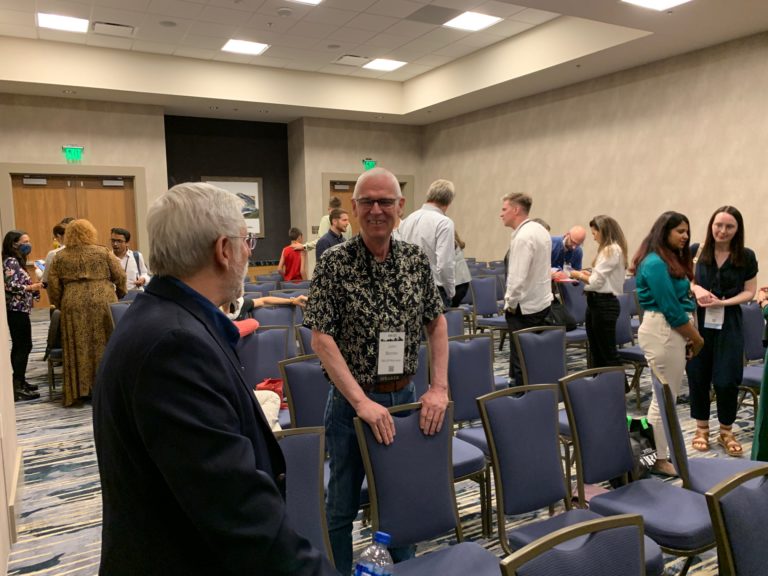
John Bones talking with then-GIJN Executive Director David E. Kaplan (left) during a networking event at the 2022 IRE conference. Image: GIJN
To illustrate the impact of the training Bones organized, Neziri offers the example of how he learned to “decode” and analyze company records at a SKUP Masterclass at Dataharvest 2022. “This experience helped me and my team to perform simple data cleaning, navigate corporate information more effectively, and apply practical tools that make complex company documents accessible and useful for reporting,” he explains.
Adds Kaplan: “As data journalism was quickly developing in the US, there were a handful of European tech-minded journalists who said ‘We can do this too,’ and began establishing data centers and data departments in Northern European media. John was one of the pioneers doing that, along with Nils Mulvard in Denmark and Helena Bengtsson in Sweden. Those three really led the way; they were transformative in their ability to seize the moment; understand the technology, and adapt it.”
Data Journalism Plus Collaboration
Bengtsson says Bones was the ultimate journalistic networker.
“I met John at NICAR in 1997, where we were only about four international participants — all from Scandinavia,” she remembers. “Nobody else was doing data journalism in Scandinavia, so John was lonely in his newsroom; we all were. We were mostly fascinated by what US journalists were doing with Excel, and FileMaker, and Microsoft Access and all those kinds of ancient tools we don’t use anymore. What we came back with was another way to structure things. You had these piles of documents, so to be able to get order, you could see the patterns and angle the stories.”
Bengtsson says Bones recognized the value of the two great modern innovations in investigative journalism – data analysis and collaboration – at the same time.
“He definitely worked on enabling a new era of collaboration – even if it was just to encourage two journalists to work together,” she says. “He really subscribed to the idea of a data journalist community; of helping each other. He found money from the Norwegian government to bring reporters from Africa and ASIA, and all over.”
She adds: “He’s a big loss – I miss him a lot. He had enormous energy in everything he did. He did the work of three people.”
Soon after Russia’s invasion of Ukraine in 2021, Bones made it a point to invite both Ukrainian and Russian journalists to speak at the SKUP conference, and to pay their costs. Even in such a highly charged geopolitical moment, Bones recognized the shared passions and potential camaraderie among journalists who believe in holding power to account, no matter where they call home or what language they speak.
“The first Ukrainian journalist he talked to had told him: ‘No I don’t want to be at a conference with Russian journalists right now.’ They didn’t even want to hear the Russian language spoken,” Bengtsson recalls. “But later, at the dinner at the event, [John] pointed to reporters from both countries and leaned over to me and said: ‘Look at them, they’re sitting there talking and sharing ideas! It shows, if you can just get journalists in the same room together…’”
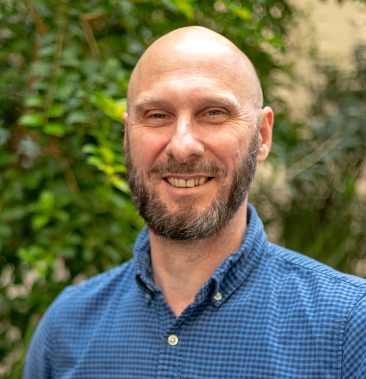 Rowan Philp is GIJN’s global reporter and impact editor. A former chief reporter for South Africa’s Sunday Times, he has reported on news, politics, corruption, and conflict from more than two dozen countries around the world, and has also served as an assignments editor for newsrooms in the UK, US, and Africa.
Rowan Philp is GIJN’s global reporter and impact editor. A former chief reporter for South Africa’s Sunday Times, he has reported on news, politics, corruption, and conflict from more than two dozen countries around the world, and has also served as an assignments editor for newsrooms in the UK, US, and Africa.


